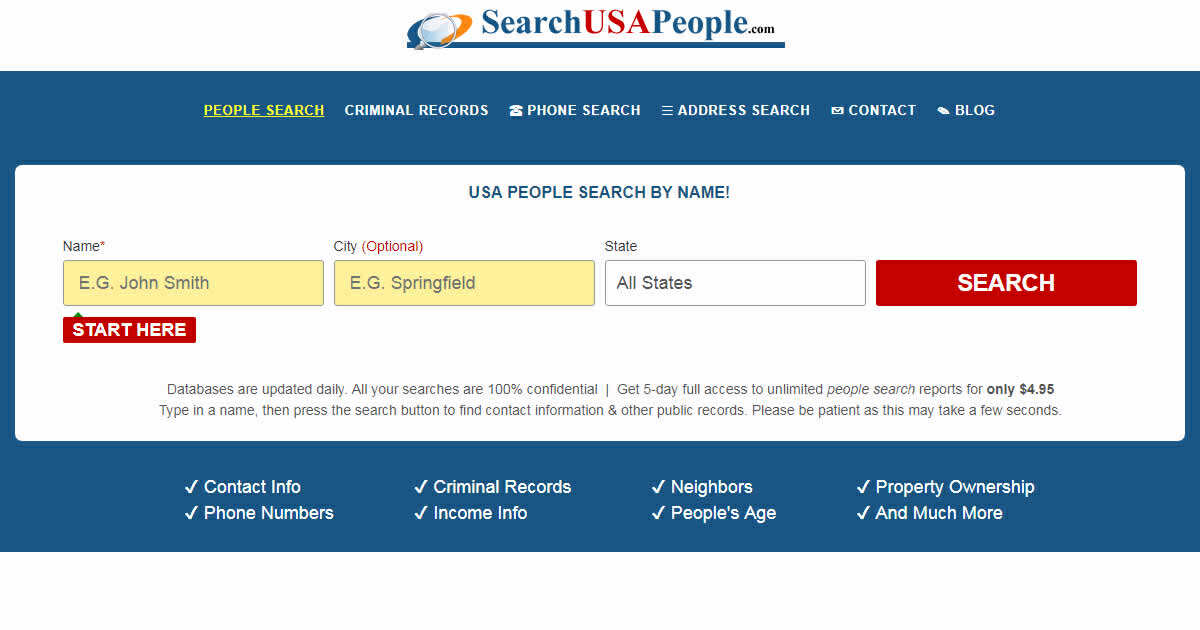How to Track an Address with a People Search Engine
In today’s interconnected world, finding accurate information about someone can be crucial, whether you’re reconnecting with an old friend, verifying a tenant’s background, or ensuring your online date is who they claim to be. This is where specialized USA people search engines come into play. These powerful platforms are designed to do much more than a simple Google search; they delve into billions of public records to provide a comprehensive overview of an individual.

What is a People Search Engine?
A people search engine is a specialized online tool that aggregates and organizes data from a vast array of public sources. Unlike standard search engines that crawl the public web person lookup service, these services have access to proprietary databases containing:
-
Public Government Records: Property deeds, marriage and divorce licenses, business filings, voter registrations, and certain court records.
-
Utility and Phone Records: White pages directory data, cell phone numbers, and address history.
-
Marketing and Consumer Data: Information from surveys, warranty cards, and public consumer behavior data.
-
Social Media and Online Presence: Associated profiles and publicly shared information from various platforms.
-
Other Publicly Available Sources: News articles, professional licenses, and more.
By compiling this data, these engines create detailed reports on individuals, all from a single search query.
What Can You Discover?
The depth of information available can be startling. A comprehensive people search report can include:
-
Contact Information: Current and past phone numbers, email addresses, and physical addresses.
-
Basic Personal Details: Age, date of birth, and possible relatives and associates.
-
Criminal and Legal History: Access to criminal records, sex offender status, traffic tickets, and other court proceedings (availability varies by state law).
-
Financial Insights: Estimated income, assets, property ownership records, and bankruptcies.
-
Digital Footprint: Linked social media profiles, usernames, and photographs.
-
Background Summary: A compiled history of a person’s residences, jobs, and educational background.
Key Uses and Applications
The ability to access this information responsibly serves numerous legitimate purposes:
-
Reconnecting with People: Find lost family members, childhood friends, or former classmates.
-
Background Checking: Screen potential tenants, verify a new nanny’s history, or check on a new romantic partner before getting serious.
-
Identity Verification: Confirm the identity of someone you’re about to do business with online.
-
Address and Phone Lookup: Verify a address before sending mail or identify an unknown caller.
-
Genealogical Research: Build out family trees and discover ancestors.
A Note on Privacy, Legality, and Ethics
It is vital to use these powerful tools responsibly and legally.
-
Legal Compliance: Reputable people search sites operate in compliance with the Fair Credit Reporting Act (FCRA). This is a critical distinction. They cannot be used for purposes of credit, employment, insurance, or tenant screening. Those decisions require an FCRA-compliant background check from a licensed Consumer Reporting Agency (CRA).
-
Data Accuracy: While extensive, the data is not always 100% accurate or up-to-date. It should be used as a starting point for verification, not as an absolute truth.
-
Ethical Use: Using these tools for harassment, stalking, or other illegal purposes is strictly forbidden and punishable by law.
How to Choose a Reputable Service
With many options available, look for a service that offers:
-
Transparency: Clear pricing, no hidden fees, and straightforward subscription terms.
-
Accuracy and Depth: Regularly updated databases and detailed reports.
-
Privacy Focus: A clear privacy policy explaining how your own search data is handled.
-
Customer Support: Accessible support to help with questions or concerns.
Conclusion
Specialized people search engines are powerful tools that leverage public records to help you find and verify information about individuals in the USA. They can provide peace of mind, enhance personal safety, and unlock connections that were once lost to time. However, with great power comes great responsibility. Always use these services ethically, understand their legal limitations under the FCRA, and remember that the information should be a guide for personal use, not a definitive judgment on an individual’s character.